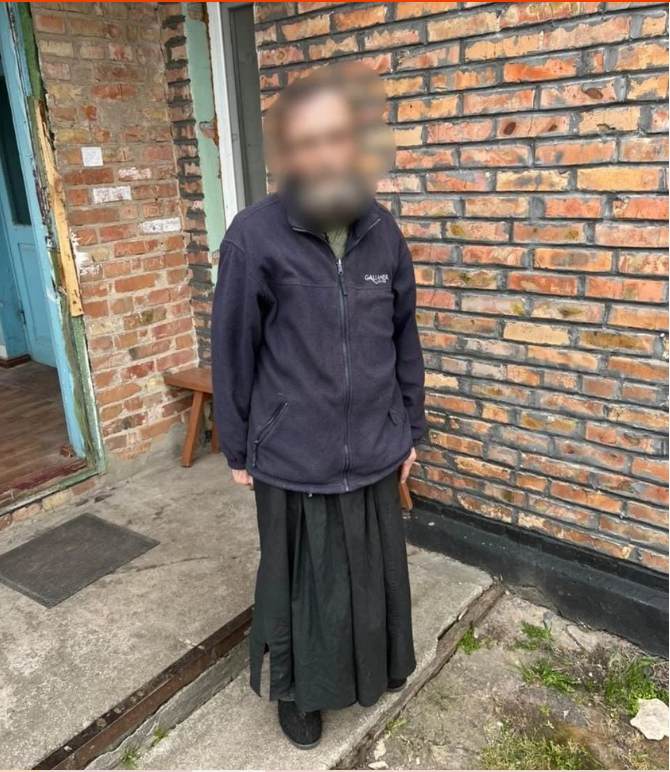Seventy-six-year-old Nikolai Evtushenko, a resident of the village of Andreevka in the Bucha district of Kyiv Oblast, was arrested in late April 2022 on suspicion of collaborationism. On April 8, 2024, he received a 10-year prison sentence with confiscation of all property.
Nikolai has a questionable past, and his behavior is difficult to fully understand. However, his story clearly illustrates two important points for comprehending the situation without resorting to propaganda or hero/villain narratives: how civilians exploit wartime to settle personal scores, and how easily the Ukrainian judicial system convicts individuals labeled collaborators, regardless of extenuating circumstances.
Residents of Andreevka call Nikolai Evtushenko “the monk.” He never actually took monastic vows. He arrived in Andreevka under a Soviet-era distribution program and taught chemistry at the local school, where he also married. Later, the couple received an apartment in Kyiv, and Nikolai found work at a boarding school for children with mental disabilities. The exact details remain unclear, but in the early 1990s, Evtushenko was convicted of child molestation and sentenced to four years. His wife divorced him. While in prison, he apparently found faith and subsequently went to Mount Athos, where he spent a considerable time as either a subdeacon or a novice. In the early 2000s, Nikolai returned to Andreevka. His ex-wife allowed him to live in the attic of her parents’ house. Because he wore a cassock around the village, locals nicknamed him “the monk.”
In March 2022, Andreevka was occupied by Russian forces. The SBU (Security Service of Ukraine) alleges that from March 15 to April 1, Evtushenko provided housing and food to Russian soldiers, “pointed out the homes of wealthy individuals, who were subsequently robbed by the occupiers,” and “performed baptism ceremonies for Russian soldiers, blessed their military equipment, and conducted other religious rites in support of the occupiers’ actions.”
Ukrainian forces retook Andreevka on March 31, immediately raising questions about the dates in the indictment, which claims Evtushenko’s crimes continued until April 1. However, this is not the main issue. Humanitarian aid began arriving in the heavily damaged village after the Ukrainian advance. One day, Nikolai joined the queue for free bread, but villagers attacked him verbally, shouting that he had “baptized the Russians.” Soon after, a local entrepreneur and territorial defense member, Vitaliy Cherkasov, brought SBU officers to Evtushenko. They spoke for about an hour before departing. However, Nikolai was arrested in late April and sent to Kyiv’s Lukyanivska detention center. The basis for his arrest was the testimony of fellow villagers.
Seventy-two-year-old Halyna Prykhodko, a neighbor of Evtushenko’s, suffers from diabetes, leg pain, and high blood pressure. She stated that Russian soldiers lived in her house for a couple of weeks. She cooked for them for the first few days but then fell ill and did nothing further. Prykhodko recalls Nikolai visiting several times wearing his cassock and carrying a calendar, drinking tea and speaking with the Russian soldiers. She couldn’t hear what they were saying.
“Baba Sonya,” over 80 years old and confined to her yard, who testified in court that she “hasn’t liked” the defendant for a long time, claimed to have seen Evtushenko walk towards a column of Russian military vehicles and “begin blessing everything around.”
Another woman testified that in March 2022, Russian soldiers asked her where a “Bandera supporter who lisps” lived, and Evtushenko interjected, indicating a different house. The soldiers then went to that house (which the woman said was empty) and removed some belongings.
A further witness described the details of entering the house. He lived nearby and came out at the sound of the commotion. The owners of the empty house had left him a key, and his wife suggested using it instead of breaking the locks. He then allegedly saw Russian soldiers carrying out “boxes of sweets.”
Evtushenko’s godfather, 76-year-old Leonid Udovod, emerged as a key witness. He claimed that the Russians came to his house searching for the aforementioned “lisping Bandera supporter”— the husband of Udovod’s niece, businessman and territorial defense member Vitaliy Cherkasov, who later handed Evtushenko over to the SBU. Cherkasov was absent (hiding in nearby woods), and the Russian soldiers left.

Evtushenko explained the events as follows. On February 24, 2022, his son Andriy called from Kyiv, informing him of the war’s commencement and his impending arrival. He arrived shortly after. On March 4, his son returned to Kyiv. Afterward, Russian soldiers came to his house and took him to the end of the street, where they spoke with several villagers in one house. Evtushenko felt unwell and asked to go home for medication. They obliged, taking him home and back. The following day, after these conversations, everyone was released. He doesn’t remember any similar incidents afterward.
Evtushenko’s son, Andriy, arrived with his wife and young daughter on February 24th. Testifying online from Germany, he said that the constant explosions were causing his daughter to have epileptic seizures. Seeing this, Evtushenko began walking around the house and praying. His son told him it was dangerous outside, but he replied that he had lived a full life and went to the pond, where he also prayed and made the sign of the cross in all four directions.
“My father is a very religious man and crosses himself at everything. He opened the doors – crossed himself. He closed them – crossed himself,” Andriy stated. This is what the villagers interpreted as blessing the passing Russian military vehicles.
Andriy also testified that “Baba Sonya” stole vegetables from Evtushenko’s garden, and her son was an alcoholic, so the relationship was bad. Regarding the Udovod family, they couldn’t forgive Nikolai for ruining his wife’s (their relative) life due to his past transgressions, preventing her from remarrying. In short, the witnesses either saw nothing that could be considered a crime or were demonstrably biased.
Interestingly, Evtushenko’s second son, Vladimir, who served in the territorial defense and hid in the woods with Cherkasov, supported his father. Evtushenko’s nephew, Vasily, hired a lawyer in Kyiv for his uncle and transported him to court hearings. Despite his past, Nikolai has a normal, loving, and supportive family; he’s not an outcast. Yet, the court accepted the testimony of clearly biased neighbors while rejecting that of his relatives.
Ultimately, apart from the statements of a few fellow villagers—who themselves admitted disliking the accused—there is no evidence against him. It’s a classic case of “he said, she said,” nothing more. The Russian soldiers were searching for armed territorial defense members, but no civilians involved in the case were harmed. They spoke with people and moved on. Near one of the houses, Yevtushenko told the Russian soldiers they were “looking for that lisping Banderite in the wrong place” and pointed to the house where he supposedly lived. The house was empty, and Russian troops were let in by neighbors (whom even the SBU has no complaints against), but in businessman Cherkasov’s place they found some candy boxes that were allegedly taken by the Russians. Even if we consider this a crime, it’s unclear what connection Yevtushenko had to it. Yevtushenko, who had lived on Mount Athos as a “monk” for a long time, kept crossing everything in sight, including passing Russian military vehicles. It’s equally unclear what crime this constitutes. Had tea with Russian troops? But Galyna Prykhodko cooked meals for them and wasn’t accused of collaboration.
For the above, Yevtushenko was charged under two articles of the Ukrainian Criminal Code: Part 4, Article 111-1 (transfer of material resources to the military of an aggressor state) and Part 6, Article 111-1 (support of an aggressor state). As the case materials show, Yevtushenko did not transfer any material resources (the candy) – the neighbors who opened the door could just as easily, if not more so, be accused of this (but they weren’t). And supporting the aggressor state by blessing military equipment is a dubious charge.
On April 8, 2024, Nikolai Yevtushenko received a 10-year prison sentence with confiscation of all property. For a 76-year-old man at the time, this sentence could be a life sentence.


